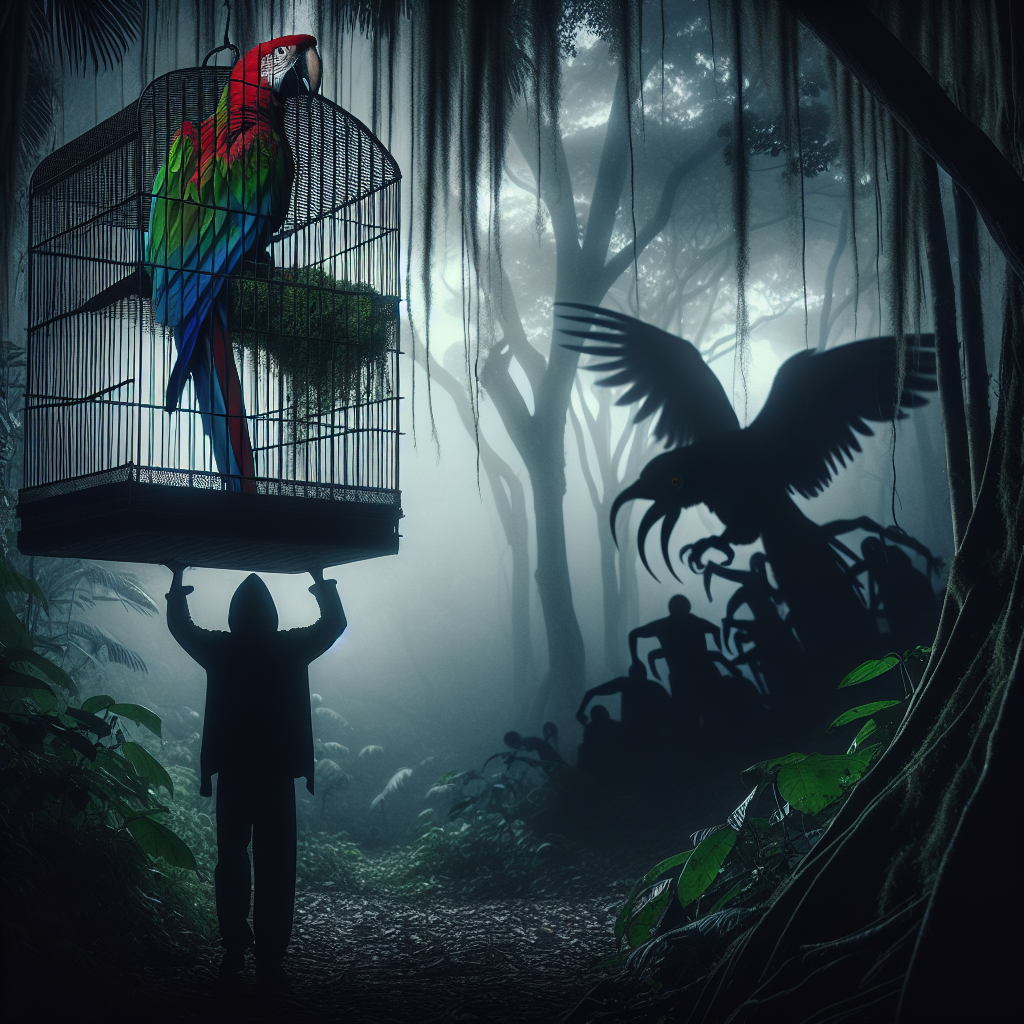Imagine a secret world hidden right under our noses, a world where rare and exotic animals are bought and sold in a thriving underground market. From captivating parrots with vibrant plumage to majestic big cats prowling in unexpected places, the global black market for exotic pets is a dark and mysterious industry that entices adventure-seeking individuals with promises of unique companionship. But beneath the surface lies a troubling reality of illegal trafficking, cruelty, and threats to biodiversity. In this article, we will explore the fascinating yet troubling world of the global black market for exotic pets and shed light on the dangers it poses to both animals and our environment.
Overview of the Global Black Market for Exotic Pets
Definition of the black market
The black market refers to the clandestine trade of goods, including exotic pets, that is illegal or unregulated by the government. It operates outside the boundaries of the legal market and is driven by the high demand for unique and rare animals.
Introduction to the exotic pet trade
The exotic pet trade is a multi-billion dollar industry that involves the buying, selling, and owning of animals that are not commonly found as pets. These animals, often originating from the wild, include reptiles, birds, mammals, and even primates. The trade capitalizes on the allure and novelty of owning a rare species, leading to significant environmental and ethical concerns.
Demand and Supply of Exotic Pets
Factors driving the demand for exotic pets
The demand for exotic pets stems from a variety of factors. People are often attracted to the idea of owning an unusual creature as a status symbol or for the thrill of having a unique pet. Social media platforms have also played a significant role in fueling this demand, as individuals showcase their exotic pets, influencing others to follow suit.
Popular exotic pet species
Several species have gained popularity in the exotic pet trade. Among them are reptiles like snakes, pythons, iguanas, and turtles. Mammals such as hedgehogs, sugar gliders, and small primates like marmosets are also sought after. Birds, particularly parrots and macaws, are highly coveted as well.
Methods of capturing or breeding exotic pets
Exotic pets are acquired through various means. Some are captured from the wild by poachers, causing disruption to ecosystems and endangering already vulnerable species. Others are bred in captivity, either legally or illegally, to meet the demand for exotic pets. Breeding practices range from sustainable and ethical to detrimental to the animals’ health and well-being.

Impacts of the Black Market for Exotic Pets
Ecological and conservation consequences
The black market for exotic pets has severe ecological and conservation implications. The widespread capturing of animals from the wild disrupts their natural habitats, leading to imbalances in ecosystems. It threatens the survival of already endangered species and can even contribute to their extinction. The trade also fuels the illegal wildlife trade, which further exacerbates these issues.
Animal welfare concerns
The exotic pet trade often subjects animals to inhumane treatment and conditions. The capture and transportation process can cause immense stress, injury, and death. Many exotic pets suffer in improper housing and handling, leading to physical and psychological distress. The trade perpetuates the notion that animals can be commodities, neglecting their inherent need for proper care and natural living conditions.
Health risks for humans
The illegal exotic pet trade poses significant health risks to humans. Exotic animals can carry zoonotic diseases, which can be transmitted to humans. The close proximity between animals and humans increases the chances of disease transmission, potentially leading to outbreaks or the emergence of new diseases. Moreover, some exotic pets, such as venomous snakes, pose direct physical risks to their owners and the general public.
Global Trafficking Routes and Hotspots
Major routes for illegal trade
The illegal trade of exotic pets follows a complex web of routes, often overlapping with other forms of illegal activity. Asia, particularly Southeast Asia, is a major hub for the trade due to its rich biodiversity. Exotic animals from Africa and South America are trafficked through various routes, including air transport and maritime smuggling.
Notorious hotspots for exotic pet trafficking
Certain regions have gained notoriety as hotspots for exotic pet trafficking. The exotic pet markets in countries like Indonesia, Thailand, and Malaysia attract buyers and sellers from around the world. Online platforms where exotic pets are traded anonymously, such as the Dark Web, further contribute to the proliferation of illegal trade.

International Laws and Regulations
CITES and its role in regulating exotic pet trade
The Convention on International Trade in Endangered Species of Wild Fauna and Flora (CITES) plays a crucial role in regulating the international trade of endangered species, including exotic pets. CITES provides a framework for countries to collaborate in managing and controlling the trade, ensuring that it is sustainable and in line with conservation goals.
National and regional legislation on exotic pet trade
Countries worldwide have implemented their own legislation to regulate the exotic pet trade. Some have banned certain species outright, while others have imposed strict licensing requirements and regulations. However, enforcement of these laws remains a challenge, and the black market continues to flourish.
Enforcement and Challenges
Efforts of law enforcement agencies
Law enforcement agencies across the globe are actively involved in combating the illegal exotic pet trade. They conduct investigations, raids, and arrests to disrupt the networks of traffickers. Collaboration between law enforcement and conservation organizations is crucial in these efforts, as they work together to gather intelligence, rescue animals, and prosecute offenders.
Challenges in detecting and prosecuting traffickers
Detecting and prosecuting exotic pet traffickers pose significant challenges. The clandestine nature of the trade makes it difficult to uncover illegal activities. Traffickers often use sophisticated methods to smuggle animals, further complicating law enforcement efforts. In addition, corruption within law enforcement agencies and involvement of organized crime syndicates hamper the effectiveness of enforcement measures.
Corruption and involvement of organized crime
The exotic pet trade is linked to various forms of organized crime, such as money laundering, drug trafficking, and human trafficking. Corruption within law enforcement agencies and government bodies enables illegal activities to thrive. Bribes and other forms of illicit transactions facilitate the movement of animals across borders and undermine efforts to combat the black market.
Online Marketplaces and Social Media
Role of the internet in facilitating exotic pet trade
The internet has revolutionized the exotic pet trade, providing a platform for buyers and sellers to connect globally. Online marketplaces and social media platforms have become hotspots for trading exotic pets, often under the radar of authorities. The anonymity and ease of communication offered by the internet have contributed to the exponential growth of the black market.
Popular online platforms used for buying/selling exotic pets
Various online platforms have become popular among those involved in the exotic pet trade. Websites like Craigslist, eBay, and private forums cater to the demand for exotic pets. Social media platforms, including Facebook and Instagram, have also become avenues for individuals to showcase and sell their exotic pets. This online market allows for easy access to illegal animals, perpetuating the problem.
Conservation Organizations and Advocacy
Role of conservation organizations in combatting illegal trade
Conservation organizations play a crucial role in combatting the illegal exotic pet trade. They raise awareness about the ecological impact and unethical practices associated with the trade, urging governments to take action. These organizations also support local communities in developing sustainable livelihoods that reduce the incentive to participate in the black market.
Awareness campaigns and advocacy for stricter regulations
Conservation organizations conduct awareness campaigns to educate the public about the consequences of the exotic pet trade. They promote responsible pet ownership and advocate for stricter regulations to control the trade. Through lobbying efforts and public pressure, these organizations aim to influence policymakers and law enforcement agencies to prioritize the protection of wildlife.
Case Studies of Exotic Pet Trafficking
High-profile cases and their outcomes
Numerous high-profile cases have shed light on the extent and severity of exotic pet trafficking. Operation Jungle Book, for example, resulted in the seizure of thousands of illegally traded animals and the arrest of traffickers in multiple countries. These cases highlight the need for international cooperation and the enforcement of stricter regulations to combat the black market trade.
The impact on confiscated animals
Confiscated animals face various challenges. Many require specialized care due to physical and psychological trauma suffered during their time in the illegal trade. Overcrowded rescue centers and limited resources strain the capacity to rehabilitate and reintroduce these animals into their natural habitats. The impact of the black market trade on confiscated animals serves as a stark reminder of the importance of addressing the root causes of the problem.
Efforts Towards Curbing the Black Market
Cooperation between governments and organizations
Efforts to curb the black market for exotic pets require cooperation between governments, law enforcement agencies, and conservation organizations. Collaborative initiatives, such as intelligence sharing and joint operations, help disrupt the networks of traffickers and dismantle the illegal trade. International agreements and partnerships are essential in achieving a comprehensive and effective approach.
Alternative approaches to meet the demand for exotic pets
Addressing the demand for exotic pets is crucial in curbing the black market trade. Promoting education and raising awareness about the ethical and environmental concerns surrounding the trade can discourage individuals from purchasing exotic pets. Wildlife sanctuaries and rehabilitation centers provide opportunities for people to interact with animals ethically, fostering a deeper appreciation for wildlife and reducing the demand for exotic pets.
In conclusion, the global black market for exotic pets poses significant threats to ecological balance, animal welfare, and public health. Efforts to combat this illicit trade require collaboration, stricter regulations, and increased awareness. It is essential for governments, law enforcement agencies, conservation organizations, and individuals to work together to eliminate the demand for exotic pets and protect the welfare of wildlife.

